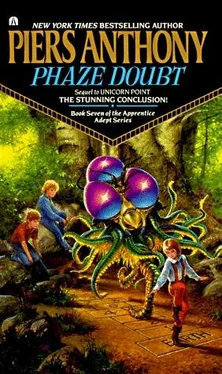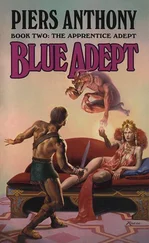Piers Anthony - Phaze Doubt
Здесь есть возможность читать онлайн «Piers Anthony - Phaze Doubt» весь текст электронной книги совершенно бесплатно (целиком полную версию без сокращений). В некоторых случаях можно слушать аудио, скачать через торрент в формате fb2 и присутствует краткое содержание. Год выпуска: 1990, ISBN: 1990, Издательство: Putnam's, Жанр: Старинная литература, на английском языке. Описание произведения, (предисловие) а так же отзывы посетителей доступны на портале библиотеки ЛибКат.
- Название:Phaze Doubt
- Автор:
- Издательство:Putnam's
- Жанр:
- Год:1990
- ISBN:9780399135293
- Рейтинг книги:3 / 5. Голосов: 1
-
Избранное:Добавить в избранное
- Отзывы:
-
Ваша оценка:
- 60
- 1
- 2
- 3
- 4
- 5
Phaze Doubt: краткое содержание, описание и аннотация
Предлагаем к чтению аннотацию, описание, краткое содержание или предисловие (зависит от того, что написал сам автор книги «Phaze Doubt»). Если вы не нашли необходимую информацию о книге — напишите в комментариях, мы постараемся отыскать её.
Phaze Doubt — читать онлайн бесплатно полную книгу (весь текст) целиком
Ниже представлен текст книги, разбитый по страницам. Система сохранения места последней прочитанной страницы, позволяет с удобством читать онлайн бесплатно книгу «Phaze Doubt», без необходимости каждый раз заново искать на чём Вы остановились. Поставьте закладку, и сможете в любой момент перейти на страницу, на которой закончили чтение.
Интервал:
Закладка:
“Aye,” she said. “Because I be with thee.”
His bad mood eased. It could indeed have been worse.
She joined him in the bed for the night, evidently feeling naughty, because in neither her machine nor wolf aspects did she use a bed. She tickled him, and the rest of his bad mood dissipated. She wasn’t exactly Icy, but she was his Promised, and in due course that would be far more significant than anything he had done with the demoness.
The three of them were kept so busy they hardly had time to be bored. They were subjected to a full program of education in all the things of Proton and Phaze, but especially in music. This amazed Flach again. He liked music, for in his unicorn form he was a natural musician, with the sound of the recorder. But why were they all being trained to be expert in different instruments?
“There must be reason,” Alien said philosophically, and Sirel agreed. Indeed, the two, who had not associated with each other much before, were turning out to be surprisingly compatible. Flach was the odd one out.
So, increasingly, for the classes, he turned the body over to Nepe, who was more patient about such things. That had another advantage: it attracted Alien’s attention, for he had always been sweet on Nepe. Thus Nepe was the center of attention, because Sirel’s other self Troubot liked her too.
One of the things they learned in detail was the scientific nature of Proton. For this all three of them assumed their Proton identities, because it was mind-bendingly complex in some aspects.
Proton seemed like a planet orbiting a star, but it was not. Not exactly, anyway. It was a black hole companion to the star, far smaller and denser than it seemed. The light from the star touched its shell and whipped around it to depart at right angles, leading to strange optical effects. The globe rotated on an axis pointed to the star, so that the South Pole should have been unbearably hot and the North Pole unbearably cold. They were hot and cold, respectively, but not to the degree they might have been, because of the bending of the light; the south got less and the north more than otherwise. The hemispheres of day and night were east and west, clearly demarked at the North and South Poles, where the line of their contrast actually crossed. That was what Flach had seen as a shadow over half the North Pole. That shadow slowly turned counterclockwise, with the clockwise rotation of the globe. At the South Pole the shadow would seem to turn clockwise. There was a complex explanation for just how the light of the sun appeared to be coming from above the equator when actually it was whipping around the tiny black hole inside the planetary shell, but they didn’t pay much attention to this. After all, magic made all kinds of illusions seem real. So at night they looked at the stars, not caring what devious route their glitters took. There was a chamber whose ceiling was one-way invisible, so that they could see the day and night skies, though no creature on the surface could see down into the Pole Demesnes. That was enough.
But a greater anomaly was the orientation of the two sides of it. Most planets, being round, had lands and seas extending all the way around, continuously. Thus they had no west or east poles. Proton had such poles—because they were the limits of the original curtain between its aspects. Beyond those Poles was Phaze, the other side of the planet. But this other side had not been apparent, because it was in the realm of magic. Proton and Phaze were similar geographically, and in their fundamental natures, but the laws by which things operated differed. Yet they remained connected, with the happenings and creatures of one tending to form alignment with the happenings and creatures of the other, as interpreted by their natural laws. Between the two had been the curtain, which few folk could cross. That curtain had wandered in seemingly curvaceous fashion across the planet, from East Pole to West Pole. But when a person crossed it, he crossed to the equivalent nexus on the other half of the planet. This had been the only effective connection between the universes of science and magic, for three hundred years.
When the Adept Clef merged the frames, he had in effect caused the magic hemisphere to slide around the planet to overlap the science hemisphere. Because they were fundamentally similar, they had been compatible, and the sets of selves had become individual folk with alternate natures. But this had changed the face of the planet. With its two sides merged, it lacked anything on the far hemisphere. Now there was nothing there.
That was why there was no reference to the far side of the planet. No one could go there, for anyone who stepped over the edge would fall into the black hole and never return. A short distance beyond the four Poles, the world ended. The old fear of Earthly navigators that they might sail off the edge of the flat world and be lost was valid here. Only on the doubled shell that was the residential continent with its peripheral waters was life possible.
The plan to save the planet (half-planet shell) was simple in essence, if not in detail. It was to slide the doubled shell around to the far side of the black hole, which was in the fantasy universe. Actually this wasn’t exactly a physical thing, because the shell already rotated around the black hole, making day and night feasible in their fashion. It was in relation to the aspects of the hole, which transcended normal physics. When the sides had been separate, the curtain had served as the crossing point from science to magic. Now there was no such avenue; a bit of the magic frame was caught within the science frame, so was accessible by other creatures of the science universe. That was the problem with the Hectare. But if the shell could be slid around to the fantasy frame, then it would be accessible by the creatures of the fantasy universe—and not by those of the science one. There might be horrendous magical menaces out there, but in the three hundred years the two sides of the planet had been parallel, the only exterior contact had been from the science side, so the magic universe seemed like a better bet.
But the playing of the Platinum Flute that had merged the shells would not be enough to slide them both around. It was a general rule of magic that a particular spell worked only once for a particular person; only creatures who had evolved with alternate forms could change them repeatedly. The merger spell had been used, and would not work again, even if that were the one needed. What was needed was a slide spell, of such power as to move half a world—and the device to summon such magic and control it did not exist. Neither did any person or creature with the ability to play it.
However, it had been ascertained that such a device could be crafted, in time, and that was being done. And a creature could be generated to play it—and that was being done. So the years necessary for each were being spent under the Poles. Only the proper elements were needed, at the right time—and this was what Nepe and Flach were coordinating.
“But why are we being trained to play music?” Nepe demanded.
“Two reasons,” the bear head in charge of the class growled. The three children had learned to understand all the animals well enough, as time passed. “First, there is a need for decoys, in case the Hectare catch on; they must not know which person or creature is the one who will play. Similar iridium flutes are being crafted, only one of which is magic, so that if any are destroyed, they will be decoys. Second, you may be needed to accompany the player, for it will be a complex tune. Your flutes may not be magic, but if they help support and guide the true flute, they are essential. You must play well enough to enable the true one to play perfectly, for the fate of the frames depends on this.”
Читать дальшеИнтервал:
Закладка:
Похожие книги на «Phaze Doubt»
Представляем Вашему вниманию похожие книги на «Phaze Doubt» списком для выбора. Мы отобрали схожую по названию и смыслу литературу в надежде предоставить читателям больше вариантов отыскать новые, интересные, ещё непрочитанные произведения.
Обсуждение, отзывы о книге «Phaze Doubt» и просто собственные мнения читателей. Оставьте ваши комментарии, напишите, что Вы думаете о произведении, его смысле или главных героях. Укажите что конкретно понравилось, а что нет, и почему Вы так считаете.










